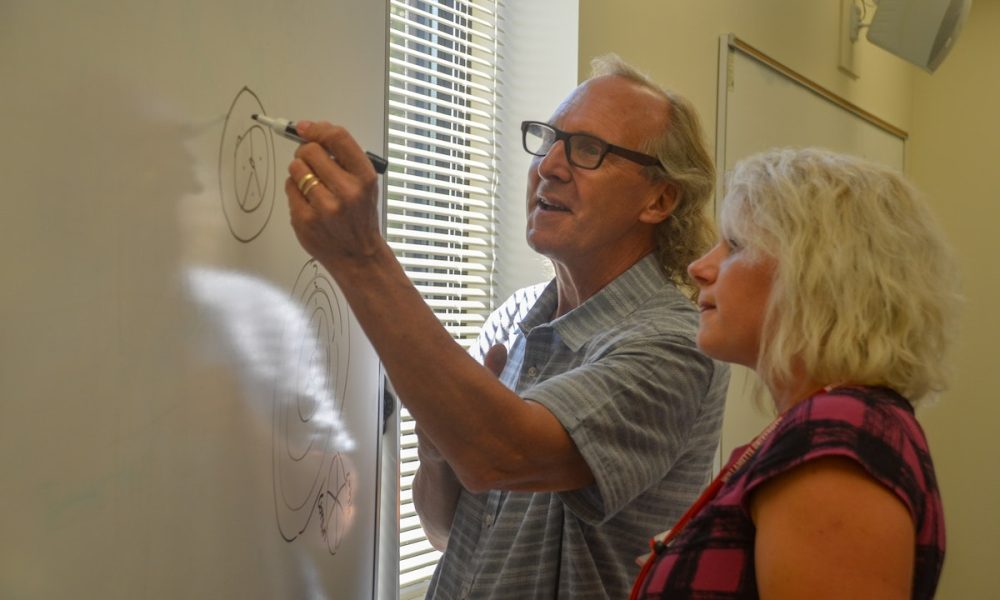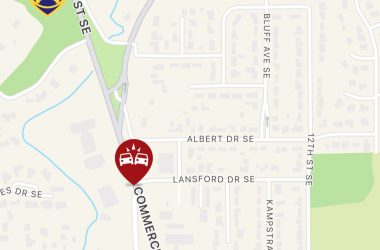 Claremont professor Frank Rogers illustrates a theological concept for seminary student Kate Kilroy during an introduction to religious education course at Willamette University on Aug. 28, 2019 (Rachel Alexander/Salem Reporter)
Claremont professor Frank Rogers illustrates a theological concept for seminary student Kate Kilroy during an introduction to religious education course at Willamette University on Aug. 28, 2019 (Rachel Alexander/Salem Reporter)
When Frank Rogers began teaching at the Claremont School of Theology 31 years ago, he was living and teaching in corrugated metal huts in the southern California desert.
The story has become something of a legend among the school’s staff, used to illustrate Claremont’s pioneering spirit and openness to doing things in new ways.
Rogers is now teaching in Salem as part of an affiliation between Claremont, a stand-alone theological school founded in southern California in 1885, and Willamette University.
The two schools started exploring a merger in late 2016 and this spring agreed to move forward with a partnership that will ultimately see Claremont relocate entirely to Salem, becoming Willamette’s third graduate school.
[ KEEP YOUR LOCAL NEWS STRONG – SUBSCRIBE ]
Rogers sees his recent move as part of the same adventurous spirit that led the school to teach ministers in metal huts.
“This feels like Lewis and Clark,” he said, just before starting class for about 20 seminary students Wednesday afternoon.
Claremont had about 430 students in master and PhD programs on its southern California campus last spring, according to Sheryl Kujawa-Holbrook, Vice President of Academic Affairs and Dean of Faculty.
In May, both college presidents signed an affiliation agreement to begin the process of transitioning Claremont programs to the Willamette campus.
Document: Frequently asked questions about the Willamette-Claremont partnership
Both schools have Methodist roots, though Willamette is now a secular institution and Claremont prides itself on an interfaith focus with courses of study in Jewish history and comparative theology.
The programs include a Master of Divinity, the degree required for ordination in many Protestant denominations, as well as master’s and PhD programs in religion. First-year students in that program are on the Willamette campus this fall as the first step in moving Claremont to Salem.
 Claremont School of Theology Master’s of Divinity students look over an assignment in an introductory class at Willamette University on Aug. 28, 2019 (Rachel Alexander/Salem Reporter)
Claremont School of Theology Master’s of Divinity students look over an assignment in an introductory class at Willamette University on Aug. 28, 2019 (Rachel Alexander/Salem Reporter)
Ron Barnard, a 52-year-old student, grew up in the Gresham United Methodist Church. He said he recently felt called to become a minister and decided to wait until the program was available in Salem so he could commute down from his home.
“This is very special for us,” he said.
Claremont has been looking to merge with a larger institution to get the school on more stable financial footing, according to Sheryl Kujawa-Holbrook, Vice President of Academic Affairs and Dean of Faculty. That’s part of a nationwide trend among stand-alone theological schools.
Small schools like Claremont struggle to keep up with the overhead costs of regulatory and administrative requirements, Kujawa-Holbrook said.
Tax records show that while the school has significant assets, including the land it owns in Claremont, the school lost money every year from 2012 to present, sometimes millions of dollars a year. A 2018 audit report identified incorporating the school into a larger university and selling its existing land as key to reversing that trend.
Administrators at both schools believe the affiliation will give students additional educational opportunities.
Willamette has an existing program allowing students to complete a bachelor’s degree and law degree in six years rather than the usual seven, and may explore a similar partnership with Claremont’s Master of Divinity, said Carol Long, Willamette’s senior vice president for academic affairs.
Claremont’s focus on interfaith studies will also bring more Muslim, Buddhist and Jewish students to campus and may raise the average age of Willamette students. Most Willamette undergraduates are between 18 and 22, and law and business students tend to be early in their careers, Long said.
Claremont’s student body last year ranged in age from 23 to 85, Kujawa-Holbrook said.
“It expands the diversity we already have on campus,” Long said.
Claremont students may benefit from partnerships with Willamette’s business school, where future pastors can learn about the basics of business or nonprofit finances, something many theology schools don’t offer.
“There’s just a lot of possibilities. We don’t know which will flourish,” Long said.
About 25 Claremont students are on campus this week. Most are doing a hybrid program combining a week or two of in-person classes per semester with online coursework, though about five will be taking courses in Salem full time.
 The Micah Building on State Street, owned by neighboring Salem First United Methodist Church, is the home of the Claremont School of Theology on Willamette University’s campus. (Rachel Alexander/Salem Reporter)
The Micah Building on State Street, owned by neighboring Salem First United Methodist Church, is the home of the Claremont School of Theology on Willamette University’s campus. (Rachel Alexander/Salem Reporter)
Claremont has leased a first-floor office in the Micah building on the corner of State and Cottage streets. It’s next door to and owned by Salem First United Methodist Church, which welcomed Claremont students and staff to campus with a lunch Thursday.
Many students said they were attracted to the school because it’s affiliated with a more liberal Methodist tradition which welcomes and ordains LGBTQ clergy. Salem’s Methodist churches, as well as the church’s Western Jurisdiction, are part of the “reconciling churches” movement, which aims for the full inclusion of LGBTQ people in the clergy and church.
Though they’re sharing some classrooms, Willamette and Claremont are still separate schools.
For now, the schools remain separate on paper. There are dozens of regulatory hurdles to clear for accreditation, student visas, financial aid and more before Claremont can become a school within Willamette. Long and Kujawa-Holbrook said it’s unclear how long the process will take, but the schools intend to bring more Claremont faculty and programs to Willamette each year.
The new Claremont arrivals had positive reviews of Salem, especially the food and natural scenery, though several students said the supply of Airbnbs and short-term rentals is lacking.
Coming from the desert of southern California, “All that water and all those trees and all those waterfalls are kind of remarkable to us,” Kujawa-Holbrook said.
Kujawa-Holbrook said the school has reached out to local faith communities and hopes to engage Salem residents through lectures, community service and an annual film series the college puts on.
“We’re anxious to meet local people beyond folks that are interested in a degree in religion,” she said.

Rachel Alexander is Salem Reporter’s managing editor. She joined Salem Reporter when it was founded in 2018 and covers city news, education, nonprofits and a little bit of everything else. She’s been a journalist in Oregon and Washington for a decade. Outside of work, she’s a skater and board member with Salem’s Cherry City Roller Derby and can often be found with her nose buried in a book.









